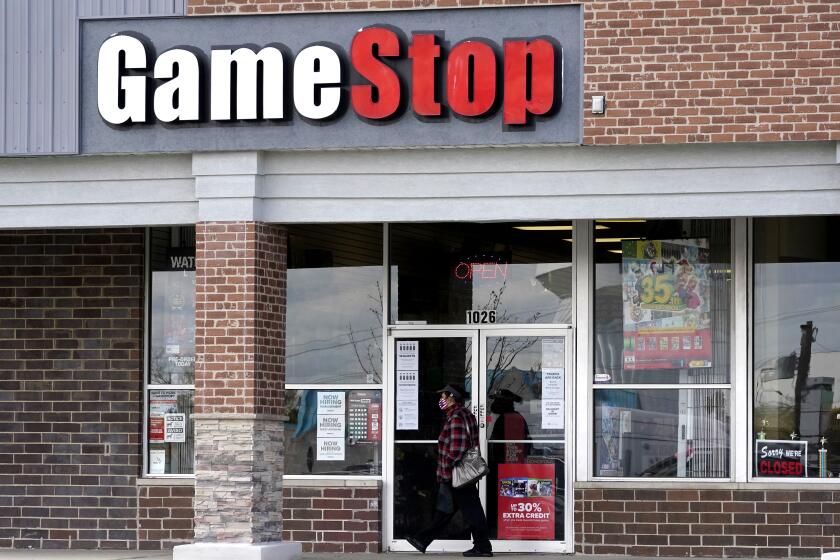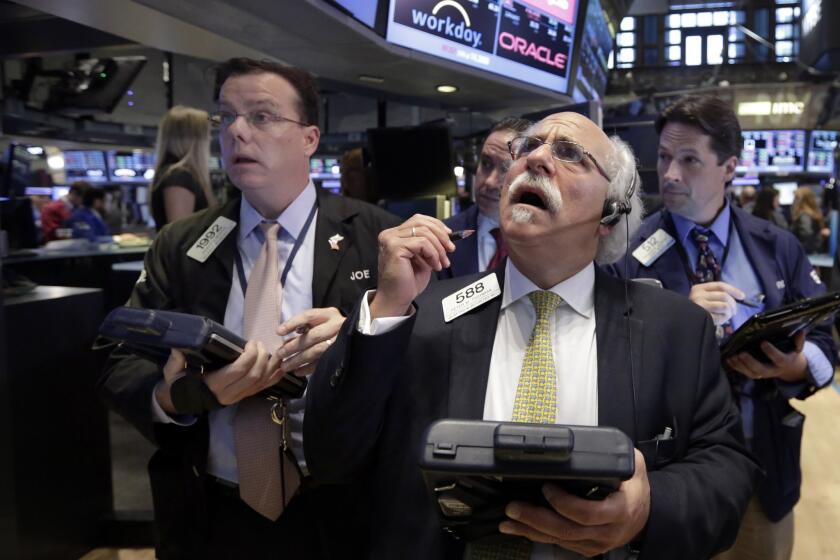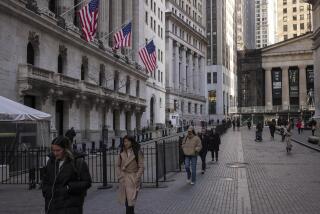Column: GameStop isn’t the first stock market mania, and it won’t be the last

So you think the stock market frenzy in GameStop is something new under the sun?
You’re not alone. Investment pundits pondering the ridiculous run-up in shares of this money-losing retailer are searching for the big picture, their fingers itching to justify typing the word “unprecedented.”
They’re dying to show they’re on to something more profound than a spin of Wall Street’s roulette wheel. Here’s Bloomberg’s John Authers:
“The people investing today are driven by righteous anger, about generational injustice, about what they see as the corruption and unfairness of the way the banks were bailed out in 2008 ... and about lacerating poverty and inequality. This makes it unlike any of the speculative rallies and crashes that have preceded it.”
People have been shown to prefer commentators with unwavering confidence over those who are more reserved and have actually gotten things right.
— Josh Brown and Jeff Macke, ‘Clash of the Financial Pundits’
Rule of Thumb: Any time someone asserts about some phenomenon on Wall Street that “this time is different,” run away. Nothing is new about the GameStop run-up except its instrument, which is the Reddit online forum WallStreetBets.
“We Boomers remember the late-90’s chat rooms very well,” a veteran investor who tweets under the handle “Diogenes” and is widely thought to be short seller Jim Chanos, observed Tuesday. “And how the masses turned on their leaders like ‘Tokyo Joe’ once the losses began to mount. Everything old is new again.”
He’s right. His reference was to the spate of free internet discussion sites that sprang up in the 1990s offering real-time stock picks, ostensibly endowed with you-heard-it-here-first magic, but in reality driven by penny stock promoters and rumor-mongering.
Tokyo Joe (real name: Yun Soo Oh Park) became one of the most notorious chat room leaders, ultimately to be charged with fraud by the Securities and Exchange Commission, which alleged that he pumped up stocks by pushing them to his legion of dues-paying followers, then dumped them at their artificially inflated price.
Park settled the SEC case in 2001 by paying penalties and disgorgement of more than $750,000.
No one has alleged thus far that the promoters on WallStreetBets have done anything illegal. It’s possible that the SEC will look into whether they’re engaged illicitly in stock manipulation — the market action is too frenzied to be ignored — but securities lawyers say that would be a hard case to make without evidence of coordinated transactions.
Before examining the long, long history of stock market manias, a reminder of what’s happening with GameStop. As we reported earlier, shares of GameStop have been on a weeks-long tear — up 1,744% this month alone, closing Wednesday at $347.51, from $18.84 on Dec. 31.
The run-up has been driven largely by a “short squeeze” targeting big investors who disdained the stock and heavily sold it short, betting that the stock would go down, indeed that the company was headed for bankruptcy.
The GameStop stock-trading frenzy is all about punishing short sellers, but why?
The David versus Goliath story is that the short sellers have been bested by a ragtag army of Reddit followers taking it upon themselves to give Wall Street short sellers a spanking.
Indeed, at least one big hedge fund, Melvin Capital, closed out its GameStop short this week after sustaining a huge loss. Melvin, however, also received an infusion of nearly $3 billion from other Wall Street firms, so it’s still solvent.
There’s no dearth of glee on the buyers’ side.
Responding to warnings that by putting their money in a chimera with Wall Street powerhouses on the other side they’re making a dumb bet, one Reddit user wrote, “We are better at being irrational than Melvin is at being solvent.”
Similar attacks have been launched on short sellers in other stocks, including the cinema company AMC Entertainment, which soared 301% to $19.90 on Wednesday.
To be fair, there’s a nugget of fundamental reasoning buried deep within the GameStop story.
A mall-based retailer of video games and consoles beset by a shift in consumer preferences from physical games to digital downloads and subsequently by the decline of face-to-face retailing during the pandemic, the company has reported more than $1.4 billion in losses since the end of 2017.
But it has been taken up by Ryan Cohen, co-founder of the online pet-supply retailer Chewy. Cohen, who owns about 10% of GameStop and has joined its board, upbraided its management in a Nov. 16 letter for failing to act nimbly to transform the company into “the market leader and ultimate destination for gamers.”
Cohen’s proposals include closing stores and pivoting “from physical hardware to digital streaming.”
The stock market rallied on the unemployment figures because it’s not a moral barometer.
Not everyone believes this to be a sustainable strategy, much less one warranting an inflation in GameStop’s market cap to more than $21 billion from about $179 million, where it stood in April before the run-up.
Bank of America analysts, for example, pointed out that shifting to digital merchandising would cut deeply into GameStop’s traditional revenue flow.
“Very simply, the more business that shifts from in-store transactions, the more difficult it will be to sell high margin pre-owned and collectibles merchandise which accounted for 46% of gross profit dollars in 2019,” the analysts wrote.
They placed a target price for the shares at $10; that was a sizable jump from their previous target of $1.50, but obviously a far cry from the current price, which is well into the triple digits.
Now let’s put the GameStop mania in perspective. Market manias are anything but uncommon. They always appear to herald a fundamental change in investor psychology or practice, and never do. They tend to have several features in common.
One is that they’re often driven by market gurus who attract large followings through cocksure projections of the future or observations about the present. “People have been shown to prefer commentators with unwavering confidence over those who are more reserved and have actually gotten things right,” Josh Brown and Jeff Macke wrote in their great 2014 book “Clash of the Financial Pundits.”
Their comments applied to what happened Jan. 6, 1981, when financial pundit Joe Granville flashed an “early warning” to the thousands of subscribers to his stock market newsletter: “Sell everything,” he wrote. “Market top has been reached.”
Past bear markets bequeathed us a host of investment maxims (but they were often wrong).
Granville’s declaration was reminiscent of that of renowned economist Irving Fisher that stocks had “reached a permanently high plateau.” He made this audacious observation on Oct. 15, 1929, or about 10 days before the string of black days heralding the great crash.
Granville’s flash took the Dow Jones industrial average down by some 4% on historic trading volume over the next two days, an extraordinary decline for the era. The Dow slumped for five weeks more, as Brown and Macke report.
Granville became, for a time, a leading stock market guru. But his stature reflected more the audacity of his calls than their accuracy. As an analysis conducted by the mathematician Ed Thorp and reported by Brown and Macke later showed, most of Granville’s “specific buy and/or short-sell candidates had done much worse than the market.”
Eventually Granville ran out his string. He kept counseling subscribers to sell the market short, even after stocks began a historic bull run in 1982. That cost his followers millions. “There are no geniuses on Wall Street,” a fellow pundit told The Times. “There are just people who are excellent for a while.”
Investors follow the crowd at their peril. Cheerleaders come and go. In the late 1890s there was Roswell Pettibone Flower, a former New York governor described as “the bull market incarnate.” Investors hung on his every word then, the way investors try to track the buying and selling of Warren Buffett today.
As I reported in my book about the Gilded Age, “Iron Empires,” Flower drove up shares of the Brooklyn Rapid Transit Co., a trolley line, by placing its target price at $75 when it was trading at $20, at $125 when it reached $50, and eventually at $135.
Just then, however, Flower was felled by a heart attack. The air rushed out of “Flower stocks” like out of a punctured balloon. J. Pierpont Morgan and his fellow bankers had to pump millions in capital into the market to forestall a downturn.
Granville, Fisher and Flower then, WallStreetBets today. Their prognostications and claims are all based on the same expectations — that tomorrow will look just like today, only more so, and that today is different from yesterday.
Over the decades, stock run-ups and run-downs have always been explained by some phenomenon that is unique and permanent. BusinessWeek proclaimed “the death of equities” in 1979 because of high interest rates. In the roaring 1980s, “liquidity,” or the supposedly bottomless pool of investable cash, was expected to prop up the stock market forever. In the 1990s, dot-coms changed the nature of business for good. And today, Reddit and retail brokerages catering to small investors, such as Robinhood, supposedly have given those investors power they never had to beat Wall Street pros.
These expectations are always true, until the moment they stop being true. Then everyone rushes for the exit, all at once. If you’re buying into GameStop, keep your eye on the door.
More to Read
Inside the business of entertainment
The Wide Shot brings you news, analysis and insights on everything from streaming wars to production — and what it all means for the future.
You may occasionally receive promotional content from the Los Angeles Times.













